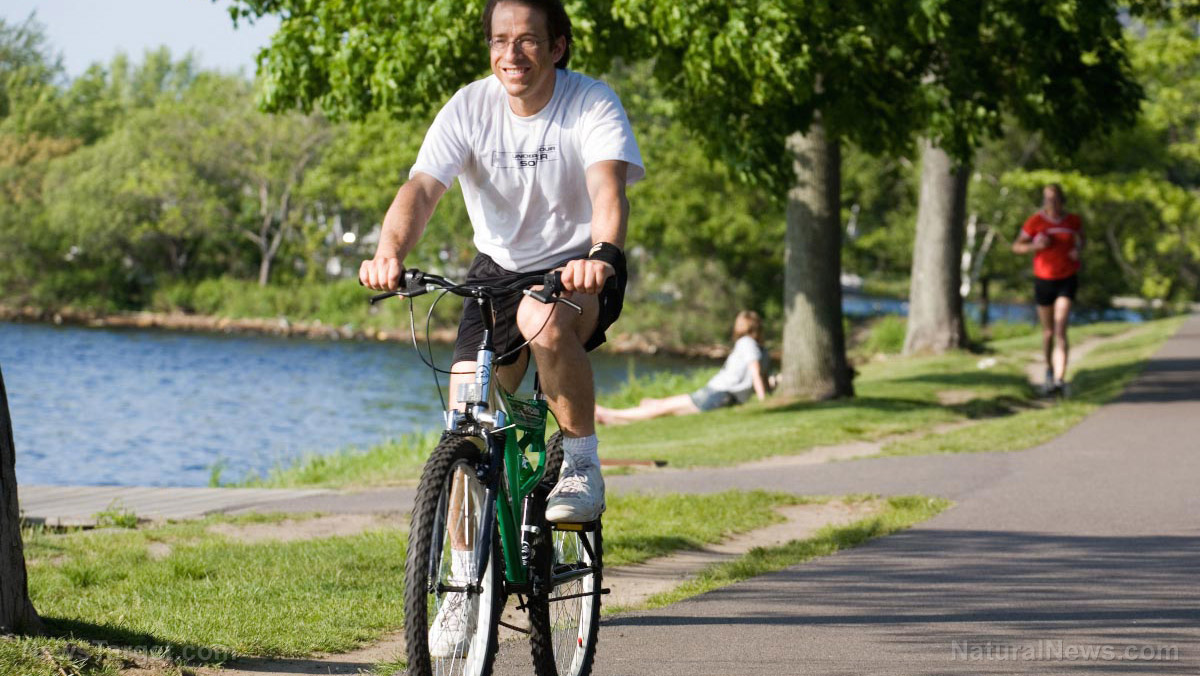Cycling is safe after all: Men can return to their bikes as new study proves riding does NOT damage sexual or urinary functions
08/01/2018 / By Zoey Sky

According to the results of a study, male cyclists have nothing to worry about when it comes to the state of their reproductive health.
Researchers confirmed that cycling doesn’t negatively affect men’s reproductive system, which can help ease the minds of those who are worried that participating in the sport can lead to “erectile dysfunction and urinary infections.” The scientists hope that the results of the study will assuage the fear of cyclists and that they resume the sport, which offers cardiovascular benefits that “outweigh any risk.” (Related: Erectile dysfunction and heart disease share common treatment.)
Researchers from the University of California at San Francisco surveyed 4,000 participants (2,774 cyclists, 539 swimmers, and 789 runners). The participants had to accomplish questionnaires such as the Sexual Health Inventory for Men and International Prostate Symptom Score which helped the researchers look into the exercise routines, history of urinary tract infections, genital numbness, and frequency of saddle sores (or discomfort from riding) that the athletes experience.
The athletes were divided into two groups. First was the high-intensity cyclists who rode “more than two years, more than three times per week, and averaging 25 miles per day” while the low-intensity cyclists included those who didn’t meet that criteria. Swimmers and runners were also part of the low-intensity category.
Participants revealed the type of bike they used along with the “seat type, seat angle, handlebar height, and how much time is spent standing instead of sitting on their bike” while they were cycling. The scientists also inquired about the gear the cyclists wore (e.g padded shorts).
The results of the study, which was published in the Journal of Urology, revealed that cyclists’ sexual and urinary health was “comparable” to the swimmers’ and runners’. Even though some of the male cyclists are at higher risk of getting urethral strictures, the narrowing of the urethra (due to injury or infection) hardly affected their reproductive health.
Based on the results, high-intensity cyclists have “overall better erectile function.” Meanwhile, men who stood more than 20 percent of the time greatly minimized their risk for genital numbness. The type of bike used didn’t have an effect on the health of the cyclists. The researchers did note that when the handlebar was below the seat, cyclists experienced numbness and soreness while riding.
Dr. Benjamin Breyer, the study’s lead author, says that the results can hopefully encourage cyclists to resume the sport, especially since it offers many cardiovascular benefits and “is low impact on joints.”
This study aims to address the worries caused by a 2012 study from the University of California at Los Angeles which implied that cycling could lead to “hormonal imbalances that could affect fertility.” A separate study revealed that “prolonged pressure on the genitals” while cycling can lead to trauma that could also influence fertility.
The scientists explain that the two studies mentioned weren’t as conclusive because they involved very small sample sizes. Dr. Breyer emphasized that their work is currently “the largest comparative study” and that it thoroughly looked into the link between “cycling, bike, and road characteristics with sexual and urinary function using validated questionnaires.” He concludes that upcoming research will explore the conditions of those who experienced numbness while cycling, which could hint at possible health concerns.
Safety tips for male cyclists
Cycling can be a rigorous sport, but following the tips listed below can help male athletes protect their sexual and urinary functions:
- Avoid racing seats with a long narrow nose. Use a wide seat with plenty of padding. Special gel-filled and shock-absorbing seats are possible options.
- Never tilt your seat upward. This increases pressure on the perineum, or the area between the anus and the scrotum.
- Adjust your seat. Make sure it’s at the correct height so your legs aren’t completely extended at the bottom of your pedal stroke.
- Wear padded biking pants for extra protection.
You can learn more about proper cycling gear and the benefits of the sport at Gear.news.
Sources include:
Tagged Under: Athletes, biking, cycling, erectile function, fitness, Infertility, men's health, physical activity, reproduction, reproductive health, research, sexual function, sexual health, sports, urinary function




















